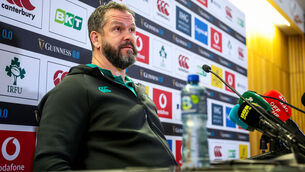Cold comfort for Ireland
John Feehan expressed quite a few yesterday evening but an outright apology was conspicuous by its absence at Six Nations HQ in Dublin as the competition’s chief executive finally went public on last Saturday’s Paris debacle.
The Irishman did at least describe the failure to stage last weekend’s game between France and Ireland as deeply disturbing and added that the tournament organisers “felt “for everyone who was discommoded, both Irish and French.”














